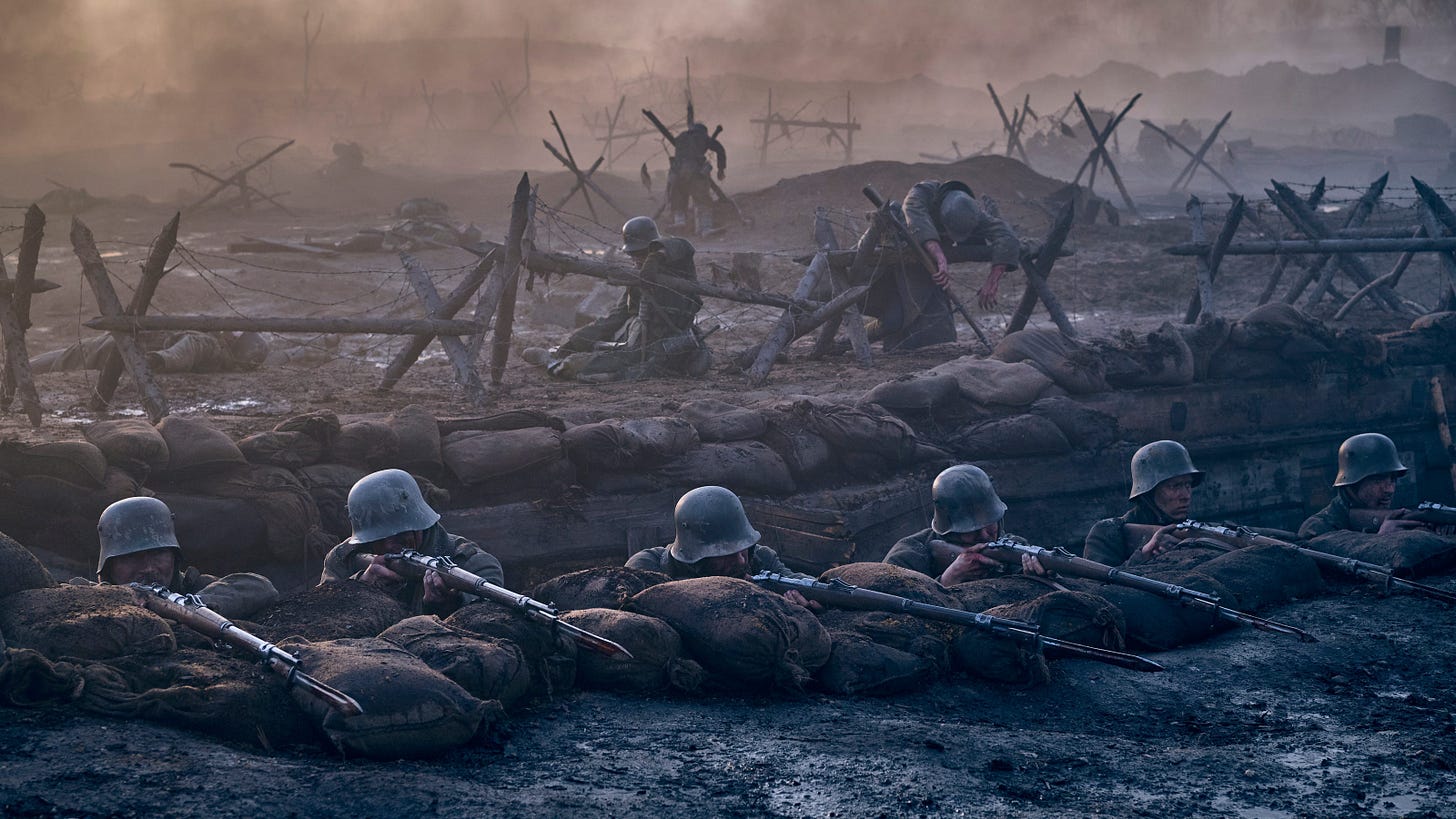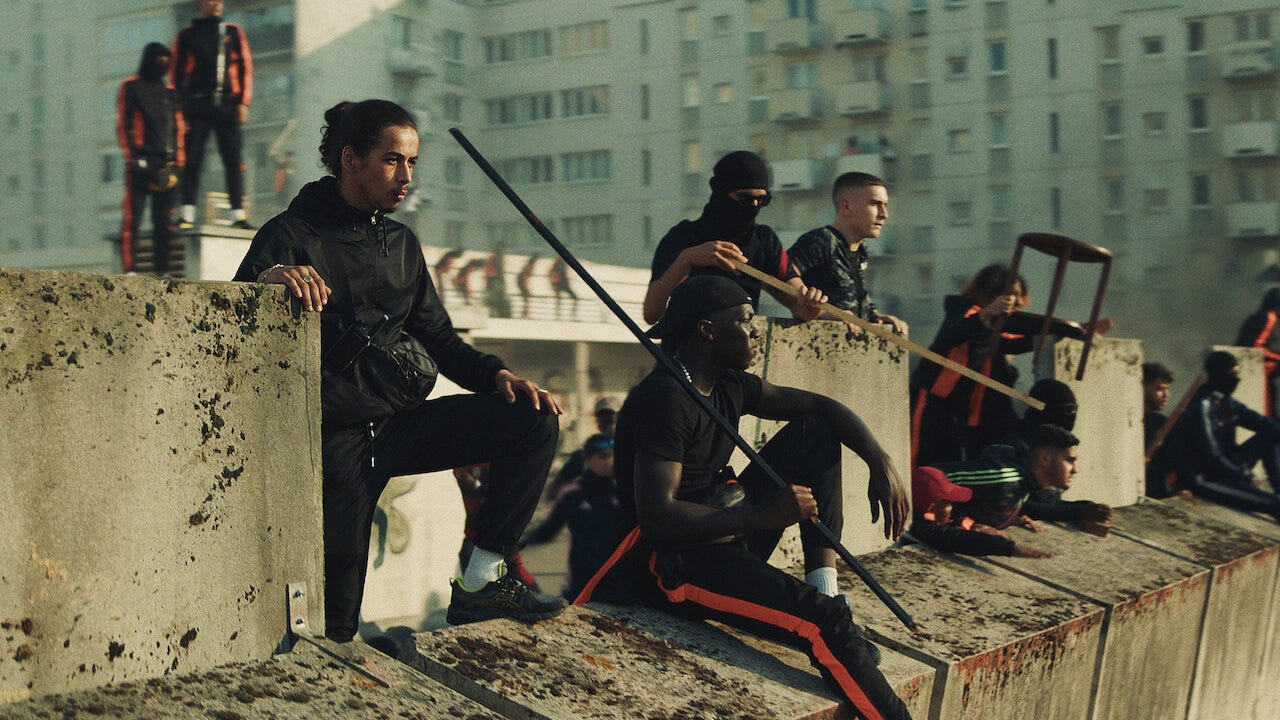The Non-Futility of War
The latest adaptation of All Quiet on the Western Front asks us to consider the futility of war, but it's war's effectiveness that should scare us more.
All Quiet on the Western Front stormed back into the public consciousness recently when the latest German film adaptation received 9 Academy Award nominations. Also, it’s available to watch on Netflix (US), a big plus for any film aiming for conversational zeitgeist. Much has been written already about how fans of the book have received this version of the story, as well as how it’s generally been received in Germany (not well, as I understand). But what has stood out to me beyond just the memorable, anachronistic score has been the number of times that reviews of this film mention “the futility of war”, “the senselessness of war”, etc. Is that what this story, or any WWI story for that matter, really teaches us?
It’s tempting to describe The Great War as having started because Franz Ferdinand was shot, which admittedly is not a good reason for 17 million dead and 25 million more wounded. That’s obviously not the case, but there’s an eleven thousand word Wikipedia entry just on “The Causes of World War I”, so the “real reasons” are elusive at best. What we do know is that on August 4th, 1914, the German army put Alfred von Schlieffen’s plan into action and marched through Belgium to invade France. Germany estimated it would take six weeks for France to surrender.
This so-called “western front” is where Erich Maria Remarque’s 1929 novel, as well as its 1930, 1979, and 2022 film adaptations, all take place. Because Germany’s plan took slightly longer than the estimated six weeks’ time, the western front turned into a stagnant hellscape where thousands upon thousands of young men were sent to die (or worse, to live) in the cold, wet trenches. As a set of decisions, certainly many bad ones were made. For example, in Alistair Horne’s book The Price of Glory: Verdun 1916, Horne recounts a story in which Wilhelm, the Crown Prince of Prussia, told an American journalist, “We have lost the war. It will go on for a long time but lost it is already.” This was at the end of 1914. The Germans would remain at the western front for another four years.
But at what point does an invasion become a war? At least in the way that we think of these things, it almost always requires the other side to resist. But what did we expect France to do in 1914 when Germany showed up at their border with Belgium? With the exception of the more extreme pacifists, I think most people sympathize with France’s decision to defend their country against the German invasion. And it’s that resistance at our eponymous western front that created a four year stalemate that is still inspiring Oscar nominations in 2022.
Is war futile, then? Or, in the case of 1914-1918 France for example, was it rather effective? It’s a bit of a semantic game, but what are the consequences when we make a culturally agreed upon stance that shies away from war while our actions and intentions support it, celebrate it, and demand it?
In February of 2022, Putin directed Russian forces to invade Ukraine, escalating a war that had been going on since 2014. There are certainly people who would argue that Ukraine shouldn’t have fought back with violence, either because they believe Russia to be in the right or because they believe in avoiding war at any and all costs, but I imagine the majority of people I know are in favor of Ukraine defending itself. Many are probably in favor of other countries sending money, weapons, or eventually even troops to help defend Ukraine against Russia. In other words, a very clear vote for “war is effective and necessary, actually”.
The examples go on and on, almost always because each specifically supported act of war is seen as a response to a greater evil—Ukraine is a condemnation of Russian imperialism, WWII against Nazism, the U.S. Civil War against racism, and so on. But who makes the ultimate adjudication of evils vs. evils? Could you be convinced, for example, that the incredibly complicated history of 20th century eastern Europe and Russia should have resulted in a unified Russian state that includes the Ukraine territory? Maybe not, but does the alleged “futility of war” depend on whether or not you could be?
Ultimately, All Quiet on the Western Front (2022) is a look at the cost of war much more than it is a condemnation of war itself. For the officers and politicians who weren’t at the front, did they truly understand that cost? If they did, would they have stayed there for three to four years after it had already become obvious that they’d lost? Weighing the cost and reward of violence is, for me, much more interesting than building a moral case against war. This exact theme also comes up in Athena, a French 2022 film directed by Romain Gavras.
In Athena, a French community is faced with making decisions about the cost of violence as a response to ongoing police brutality and oppression. As many of the community’s young people begin to riot in response to the death of one of their own, they definitely succeed in getting the attention of the authorities, but at the cost of damaging the very neighborhood in which they live. For what gain? Is it enough to consider that they’ve become inspired to stand up and say they’ve had enough? To strike fear in the hearts of the organizations who assumed they could continue to oppress, injure, and “accidentally” kill them without consequence? Characters have different answers to these impossible questions, as you might expect.
Without spoiling the film, I’ll say that Athena goes in directions that will be more satisfying to some than to others, and that it wasn’t anywhere near the ending I’d have liked to see for something that had started out tackling these questions about the cost of violence so courageously. But AQOTWF shies away from them, too, by embracing what feels like the most obvious response to a depiction of the vulgarities of war: isn’t it awful? Of course it is—so why do we keep supporting it?




